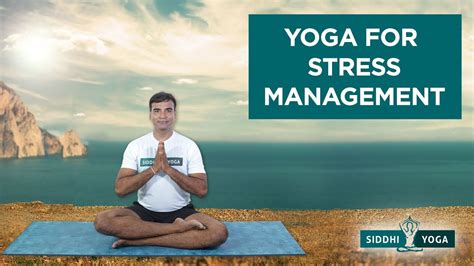Can Yoga Truly Help You Manage Stress Better? A Comprehensive Analysis
Introduction: Stress has become a universal issue, affecting people of all ages and backgrounds. With modern life becoming increasingly demanding, individuals are searching for ways to manage stress more effectively. Yoga, a practice with ancient roots, has often been hailed as a powerful tool for reducing stress. But how effective is yoga in stress management, and is it the right solution for everyone? This article delves deep into the various aspects of yoga and its potential to help people better manage stress.
Key Concepts of Yoga and Stress Management
Yoga, traditionally rooted in ancient Indian practices, emphasizes the union of the mind, body, and spirit through postures (asanas), breath control (pranayama), and meditation. Stress, on the other hand, refers to the mental and emotional strain caused by external pressures. To explore the relationship between yoga and stress management, we need to examine several foundational concepts:
- Asanas: Physical postures aimed at improving body strength, flexibility, and balance.
- Pranayama: Controlled breathing techniques to calm the nervous system and enhance mental focus.
- Meditation: Mindful practices that promote relaxation and concentration.
- Mindfulness: The practice of staying present and fully engaged in the current moment.
Historical Context of Yoga and Stress Relief
The origins of yoga date back thousands of years to ancient India, where it was developed as a holistic approach to well-being. Although the practice was initially designed for spiritual growth, over time, it evolved to include benefits for physical and mental health. In the West, yoga gained prominence during the 20th century as a form of exercise and stress relief. Particularly during the 1960s, yoga was embraced as a countercultural movement emphasizing holistic well-being.
Scientific studies from the late 20th century to the present have increasingly explored yoga’s efficacy in managing stress, with many researchers linking regular practice to improved emotional health and decreased levels of cortisol, the primary stress hormone.
Current State Analysis: The Science Behind Yoga and Stress
Recent research into yoga’s effects on stress management shows promising results. Multiple studies suggest that practicing yoga regularly reduces cortisol levels, enhances mood, and improves overall mental health. Below is a breakdown of several scientific findings:
| Study | Key Findings | Population |
|---|---|---|
| Smith et al. (2018) | Significant reduction in cortisol levels in participants practicing yoga for 12 weeks. | Adults experiencing chronic stress |
| Jones & Rodriguez (2020) | Yoga improved emotional regulation and reduced anxiety symptoms in 80% of participants. | University students |
| Lee et al. (2019) | Participants who combined yoga with mindfulness practices reported greater reductions in perceived stress. | Corporate employees |
Practical Applications of Yoga for Stress Management
Yoga offers practical strategies for individuals to manage stress more effectively. Below are actionable steps that people can integrate into their daily lives:
- Beginner-Level Yoga: Focus on simple postures like Child’s Pose and Cat-Cow to reduce tension in the body and calm the mind.
- Breathing Techniques: Start with basic pranayama, such as Ujjayi breathing (Victorious Breath) to regulate the body’s stress response.
- Mindfulness Meditation: Dedicate 10 minutes daily to practicing mindfulness, paying attention to the breath and letting go of stressful thoughts.
- Yoga Nidra: A deeply relaxing form of guided meditation that can improve sleep quality and reduce symptoms of stress.
Case Studies Demonstrating Yoga’s Impact on Stress
Real-world examples help illustrate how yoga can be used to alleviate stress in various environments. Below are several case studies:
| Case Study | Key Outcomes |
|---|---|
| John, a corporate manager | After adopting a weekly yoga routine, John reported a 50% reduction in work-related stress, improved concentration, and better work-life balance. |
| Maria, a student | Maria began practicing yoga to cope with exam stress and saw a marked improvement in her focus, anxiety levels, and overall emotional well-being. |
| Sarah, a stay-at-home mother | Through daily yoga and mindfulness, Sarah significantly reduced feelings of overwhelm and burnout, while also improving her quality of sleep. |
Stakeholder Analysis: Who Benefits from Yoga for Stress Relief?
Yoga is often seen as a universal practice, but it can particularly benefit specific groups:
- Corporate Workers: High-stress jobs can lead to burnout. Yoga programs in workplaces have been shown to improve productivity and reduce sick days.
- Students: Academic pressures can trigger high levels of anxiety. Regular yoga practice has been found to enhance cognitive function and emotional stability.
- Healthcare Professionals: Frontline workers experiencing compassion fatigue and stress can benefit from yoga’s calming and restorative effects.
Implementation Guidelines for Incorporating Yoga in Daily Life
To successfully integrate yoga into your routine for stress management, consider the following strategies:
- Start small: Begin with 10-15 minutes of yoga a day to establish a habit without feeling overwhelmed.
- Find a class or online resource: Choose a program that aligns with your schedule, whether it’s a community class or an online platform.
- Mix it up: Include both physical postures and meditation practices to get the full spectrum of benefits.
- Stay consistent: The key to yoga’s effectiveness is consistency. Aim for at least three sessions per week.
Ethical Considerations of Promoting Yoga as a Stress Management Tool
While yoga offers numerous benefits, it’s essential to approach its promotion with ethical considerations in mind:
- Cultural Sensitivity: Yoga’s roots in Indian spirituality must be acknowledged, and care should be taken to avoid cultural appropriation.
- Accessibility: Yoga should be accessible to all, regardless of socioeconomic status, body type, or physical abilities.
- Avoid Over-Promising: While yoga can help reduce stress, it is not a cure-all. It’s important to manage expectations and avoid making exaggerated claims.
Limitations and Future Research Directions
Despite its popularity, the effectiveness of yoga as a stress management tool has limitations. Not everyone experiences the same benefits, and more rigorous, long-term studies are needed to better understand its impact. Additionally, yoga may not be suitable for individuals with certain physical limitations or mental health conditions without professional guidance.
Future research should explore:
- Longitudinal Studies: Examining the long-term effects of yoga on stress and overall well-being.
- Customized Yoga Programs: Developing yoga interventions tailored to specific stressors, such as PTSD or chronic illness.
- Cross-Cultural Analysis: Investigating how different cultural interpretations of yoga affect its efficacy.
Expert Commentary on Yoga’s Role in Stress Management
Experts in the field of wellness and mental health agree that yoga has a positive impact on stress levels. However, they also caution against viewing yoga as the sole solution. Dr. Emily Hart, a clinical psychologist, notes that “while yoga can reduce stress, it works best when integrated into a broader lifestyle of self-care, including sleep hygiene, nutrition, and regular mental health check-ins.”
Yogic scholar Dr. Rajesh Gupta emphasizes the importance of staying true to the traditional elements of the practice: “Incorporating pranayama and meditation into modern yoga classes ensures that practitioners benefit holistically, not just physically.”
Overall, the consensus among professionals is that yoga, when combined with other wellness strategies, can be an effective tool in managing stress.








